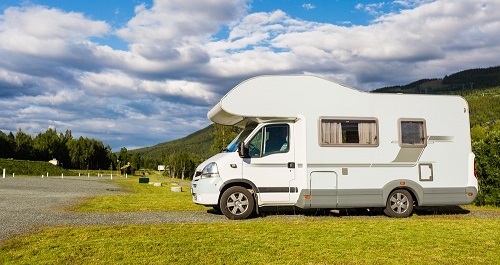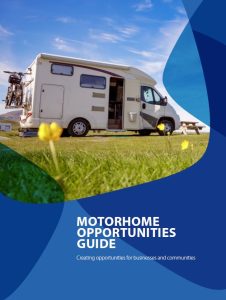Motorhome Opportunities Guide
This Motorhome Opportunities Guide is designed for any tourism business, individual or community group that wants to find out more about setting up a Motorhome Aires site. It provides an overview of the market, helping you to assess the value of this to your business, as well as practical advice and simple ideas on how to successfully market your business to the ever-growing Motorhome market.
With a rise in the number of motorhomes coming to Scotland and Angus in recent years, there has been an increased interest in the provision of continental style “Aires”. The word ‘aire’ is short for the French term ‘aire de service’, which is essentially a low-cost camping area for self-contained motorhomes only. These sites are very common across Europe and are becoming more common across Scotland.
The demand from motorhome owners for small, simple, and low-cost opportunities for short stopovers can complement the full service offer available from Caravan and Camping sites. Motorhome Aires are an opportunity to create extra income for community groups or private landowners. Communities who may have a small area of land or a number of car park spaces at their village/community hall could utilise these to generate additional income for the community managed facilities whilst drawing visitors to their area and other locally available services and attractions.
This Motorhome Opportunities Guide has been prepared to give Angus businesses and communities information and ideas on how to harness the opportunity of the motorhomes market and to develop, deliver and promote to the market. The guide is aimed at encouraging businesses and communities to work together to create a joined-up experience which will attract visitors, increase visitor spend and maximise opportunities for the region’s wide range of attractions and activities.
In recent years motorhome tourism has been growing steadily in the UK, driven by factors such as the desire for flexible and independent travel, increased interest in outdoor activities, and a growing trend towards experiential travel.
The market for motorhome tourism in the UK is diverse, ranging from families and retirees to solo travellers and young couples. This diversity in demographics contributes to the resilience and growth of the market. It contributes significantly to the UK economy through spending on accommodation, dining, attractions, and other travel-related expenses and supports local businesses in rural and remote areas.
There is a growing emphasis on sustainability and responsible travel within the motorhome tourism sector. Many travellers are seeking eco-friendly options, such as electric or hybrid motorhomes, and are mindful of their environmental impact while on the road.
Advancements in technology, such as GPS navigation systems, mobile apps for finding campsites and amenities, and solar-powered accessories for motorhomes, are enhancing the convenience and comfort of motorhome travel in the UK.
Overall, the UK motorhome tourism market continues to grow and evolve, driven by changing consumer preferences, advancements in technology, and a desire for authentic and immersive travel experiences.
Key Facts:
- An estimated 755,000 touring caravans and motorhomes are regularly in use in the UK, with estimated expenditure for touring holidays reaching £2.6 billion (Cover4Caravans, 2023).
- According to Find My Leisure Vehicle (referenced by the National Caravan Council), there were 84,000 searches for new motor caravans and 44,000 for new campervans in September 2022.
- Research for the Caravan and Motorhome Club by the Centre for Economics and Business Research (Cebr) in 2022 showed an increase in number of people predicted to buy leisure vehicles in the next five years, with 8% of UK adults likely to buy a campervan, 7% of UK adults likely to buy a motor caravan and 7% of UK adults likely to buy a motorhome.
- Although there are more vehicles on the road, the services to accommodate safe overnight parking and the disposal of toilet and grey water waste have not developed at the same pace. More sites in sustainable and safe locations are needed and this is supported through research conducted by Motorhome and Campervan Users. (Research, 2019).
The Scottish Motorhomes Market
To better understand the drivers behind these kinds of trips and to help consider what solutions may be appropriate, VisitScotland undertook new research on these markets, during the summer of 2023. The summary findings provide useful insight on the characteristics of this group of visitors, their level of knowledge and awareness, their behaviour during their trips and activities undertaken. The full Motorhomes, Caravan and Camping research is available the on VisitScotland website.
Visitors
- Respondents were mostly domestic visitors, older, and with no children. The most common vehicle used on a trip in Scotland was a campervan. More than a third had been using some form of camping vehicle for over ten years.
Trip characteristics
- The season for taking trips is relatively long. The season lasts from spring to autumn, offering potential for off season trips. Often more than one place is visited in a single trip.
- Access to facilities is important as part of the overall trip. But some visitors are keen to “get away” from the traditional campsite experience.
Awareness of guidance and best practice
- Respondents were well informed about guidance and regulations and eager to know more. There are opportunities to inform visitors, particularly regarding parking and waste disposal.
Activities undertaken
- Survey respondents spend money on a range of activities while in destination. They would be willing to pay for infrastructure and facilities that meet their needs.
- 86% had bought locally produced food and drink. 75% took part in some activity that they had paid for.
Facilities used
Respondents were willing to pay for a variety of facilities, including:
- Black waste disposal (motorhome users)
- Showers (campervan users and campers)
- Electrical hook ups (caravan users)
Visitor experience
Respondents were very satisfied with their experience in Scotland and were likely to take a similar trip in the next five years. Around three quarters were very likely to recommend Scotland as a destination to their friends and family.
Broadly, their experiences with local communities were positive. Although some visitors noted more mixed attitudes. The main areas suggested for further improvement include information about and access to waste disposal and parking facilities.
Motorhome Stopovers are an opportunity to create extra income for community groups or private landowners. This can present an additional income opportunity for communities who may have a small area of land or a number of car park spaces at their village/community hall.
These areas could be utilised to generate additional income for the community managed facilities whilst drawing visitors to their areas and other locally available services and attractions.
Aires can be relatively low-cost to set-up, and they can be used all year round, or for shorter seasonal periods, depending on what would work best for you and your business. The site can be unmanned, and payment taken either by an honesty box or via a simple payment system.
Unlike formal campsites, there is no expectation by users that they will book in advance and as such no booking system is needed, unless you or your group would prefer this. As most motorhomes are self-contained there is no requirement or expectation to provide onsite facilities such as toilets, showers or electric hook-ups, although additional facilities could allow you to consider increased fees for their use.
What would an Aire need to provide?
An Aire can be as simple as providing a safe overnight parking space. Ideally, there would be a basic water supply and waste disposal/bin (recycling) and grey waste disposal. The refilling of water tanks and disposal of waste could then also be offered to passing motorhomes who are not parking overnight.
CAMpRA (Campaign for Real Motorhomes Campaign) has found that some Aires generate more income from providing fresh water supply top-up and waste disposal top-up services than from overnight parking. The facilities chosen will depend on the site itself and the ease of providing additional services e.g., electric hook-ups/water. The ground should be reasonably level. Due to the weight of motorhomes, grass is not normally considered suitable unless reinforcement is used. Hard standing is better suited to year-round use.
Site Certification
Certain clubs and organisations can issue certificates which permit owners to have up to five motorhomes on their land without the need for a caravan site licence. These are often known as a Certificated Location or Certificated Site. The issuing body will carry out a site inspection and contact Angus Council planning to check if any local conditions may affect the issuing of the exemption certificate and consider the impact of objections from neighbours. Although not an essential / legal requirement, site certification is an aid to the marketing and credibility of a site. An example of guidance for designing overnight parking and providing a Service Point for Motorhomes can be found on the CAMpRA Business Hub.
Permissions and Licenses
If you are interested in setting up and operating an aire then you can submit a do I need planning permission enquiry form to Angus Council who can advise on whether planning permission is likely to be required or not. Providing information on the number of spaces you are proposing and details of any hardstanding and/or facilities will help in assessing if planning permission is required.
A caravan site licence is not necessary if the owner applies for a Motorhome Exemption Certificate (see Motorcaravan Exemption Certificates below). The main criteria to be able to use the Exemption Certificate route is that no more than five motorhomes can be stationed on the site at any one time.
CAMpRA have developed extensive information on the steps to create an Aire for small businesses and landowners who wish to create an Aire. The following is their overview on the suggested steps and therefore should be read in conjunction with the detailed information in the linked documents.
Survey of Land
Carry out survey of land identified and establish suitability for parking motorcaravans and what services can be offered. Considerations include:
- Access roads, site entrance and turning circles
- Ground condition – hard standing vs grass only
- Access to fresh water supply and type of drainage for wastewater and sewerage
- Rubbish removal
Design
A design plan will help decided what size and type of Aire is required. Plans can be from hand sketched up to professionally drawn. Considerations for spacing of vehicles and how to demark parking areas can be decided at this stage.
Planning and Exemption Certificates
For small Aires with 5 and under parking spaces for motorcaravans, Exemption Certificates may be all that is required. It is unlikely that planning consent is required from the local authority for the actual site, but it is always best to check as for example if you are moving the access to the site or installing hardstanding, planning permission may be needed.
Seasonal vs Year-Round
Note for existing sites who want to add on an Aire, if you currently have seasonal planning you will need to apply for year-round planning permission and update your site licence.
Model Standards
Model standards have been prepared by CAMpRA UK Ltd as suggested conditions to be used in the granting of caravan site licences when applications for Aires are made using the existing legislation. These are different for Scotland from England and Wales and examples can be found on the Business Hub page on the CAMpRA website.
Insurance
Ensure that you have the appropriate Public Liability insurances for running the site. Should a member of the public injure themselves on site and seek compensation, public liability insurance will cover the legal costs around defending a claim, as well as any damages you may have to pay.
Health and Safety Risk Assessment
A Health and Safety Risk Assessment should be carried out. These are very straight forward to prepare and there is lots of help available on the Health and Safety Executives website.
Certification for Installations
Whilst electrical charge points are not required on an Aire, for any electrical installations (lights etc.) you must use a qualified electrician and have all work certified. If you are creating a new connection to the mains sewerage system, you should contact your local Water Authority and check their requirements.
Fire Safety
Ensure that an appropriate fire safety risk assessment is carried out and appropriate notices on the site are visible. The CAMpRA Fire Safety Report is an essential read. It was commissioned by CAMpRA from an Independent professional Fire Safety Expert, and it is recommended that you give this to the person carrying out your fire assessment. The Scottish Government website also has information on fire safety for holiday camping and caravan sites.
Site Notices
Design appropriate notice boards for sites either to display on your website or to display at the Aire. CAMpRA recommended that there is a site plan and information relating to local services.
CAMpRA Accreditation
Finally speak to CAMpRA and where possible, one of their members will visit the site and carry out an accreditation visit. It’s a free visit and you will be able to order and display an accreditation sign.
The significant growth in motorhome tourism has brought infrastructure challenges. In particular, there is limited provision in Angus for responsible disposal of wastewater, some of it chemically treated, from motorhomes onboard toilets and drains.
This has a potentially significant impact on communities and affects the experience of visitors who seek to dispose of their waste responsibly. There is demand for the provision of more facilities which can be delivered and maintained by local communities, charities, businesses, or other interested parties.
In planning the development of your site, it would be beneficial to consider the following:
Water Supply
Providing drinking water is a service that may be expected by many visitors and so is an element to consider even if it is not legally required for specific developments. If providing a private water supply there is a legal requirement to have it tested. Private Water Supplies. Further information on water supply requirements can be found on the Drinking Water Quality Regulator for Scotland website.
Wastewater Disposal
Camping vehicles produce two main types of water waste: grey and black.
Grey waste: water from non-toilet plumbing systems such as sinks and showers which collects in an onboard wastewater tank in the vehicle. Grey waste should be emptied at a campsite disposal area to go into the sewage system for proper treatment.
Black waste: this is chemical toilet waste. Toilet waste should not be emptied anywhere other than a designated area at a campsite, a motorhome service point, or home sewage systems. This waste should also not be disposed of at grey waste sites.
If plan to utilise the existing public water and foul drainage network, you should contact Scottish Water for advice on its suitability. For some small-scale sites, facilities for the disposal of wastewater may not be a legal requirement, for larger ones they are. Scottish Water and SEPA have developed Campervan and Motorhome Waste Disposal Guidance which provides comprehensive advice on this matter.
Waste & Recycling
The opportunity to dispose of waste and / or recyclables will be expected by many visitors. This would however be classed as business waste and Angus Council can provide you with further information. Find out more on the Angus Council website.
Water Supply and Wastewater
If your site will use existing public sewerage network, contact Scottish Water for advice on suitability and capacity in your area. The Campervan and Motorhome Waste Disposal Guidance document jointly produced by Scottish Water, SEPA and Highland Council provides comprehensive advice on this matter.
Electricity
Electrical hookups may be expected by some visitors. However, generally they are not required.
Safety
Any safety hazards must be thoroughly assessed before motorhomes are allowed on site e.g., deep water, heights, disused buildings. Safety measures will need to be put in place to minimise the risk to site visitors, especially children.
A marketing plan is like a roadmap that helps you promote your business. It’s a plan that shows you what to do to reach more people and tell them about the great things your business offers. It’s like a guide to make sure you’re doing the right things to attract customers and make your business successful.
Develop a cohesive marketing plan with measurable targets to help you to keep on track is essential. Start this process within your business. Use the resources readily available to you and work with your team to formulate your plan of action.
Marketing a motorhome Aire to visitors involves several strategies to attract and retain customers. Here are some effective marketing tactics to try:
- Branding: Invest in high-quality signage, branding materials, and promotional materials to attract attention and convey professionalism. Use consistent branding across all marketing channels to create a memorable and cohesive brand identity.
- Online Presence: Create a user-friendly website with detailed information about the motorhome Aire, including facilities, location, pricing, and nearby attractions. Utilise search engine optimization (SEO) techniques to improve visibility in search engine results.
- Social Media Marketing: Engage with potential customers on popular social media platforms like Facebook, Instagram, and Twitter. Share visually appealing content, such as photos and videos of the motorhome Aire, and interact with followers to build relationships and generate interest.
- Online Booking Platforms: List the motorhome Aire on popular Motorhome booking platforms, such as Park4night or PitchUp. Optimize your listings with attractive photos, detailed descriptions, and positive reviews to attract bookings. Decide if you want to provide on-line booking on your web site.
- Email Marketing: Build an email list of past customers and potential leads and send out regular newsletters with updates, special offers, and promotions. Personalize your emails to cater to the specific interests and preferences of your audience.
- Content Marketing: Create valuable and informative content related to motorhome travel, such as blog posts, travel guides, and tips for road trips. Share this content on your website and social media channels to establish your expertise and attract visitors to your motorhome Aire.
- Local Partnerships: Collaborate with local businesses and tourism organizations to cross-promote each other’s services. Offer special discounts or packages for visitors who patronize partner businesses, such as restaurants, attractions, or rental services.
- Customer Reviews and Testimonials: Encourage satisfied customers to leave positive reviews and testimonials on your website, social media pages, and review platforms. Positive word-of-mouth can significantly influence potential visitors’ decisions to book a stay at your motorhome Aire.
- Customer Experience: Focus on providing exceptional customer service and a welcoming atmosphere to ensure positive experiences for visitors. Encourage feedback and actively address any concerns or suggestions to continuously improve the quality of service.
Top Tips
Think Local: Let your visitors know what other attractions are within 15 minutes’ drive, or even a cycle away! What wildlife do you have on your doorstep? The ordinary for you may be extraordinary for others.
Pictures Are Powerful: Angus’s natural landscapes and wildlife are undeniably picturesque, ideal for social media.
Make A Good First Impression: First impressions are so important, so choose a lead image for your listing that captivates potential customers.
Opportunities for Local Angus Businesses
Working together
Tourism businesses working together to create ‘must see’, ‘must do’ visitor offers will attract visitors and encourage them to stay longer and spend more. Business collaboration, therefore, plays a key role in developing innovative products and experiences for Angus.
Collaboration in tourism works on several levels, from informal relationships all the way up to formal partnerships and even as destination groups. Joint activity can range from simple networking to committing joint funds and resources for mutual gain.
For Angus tourism businesses, collaboration means the opportunity to punch well above their weight. Visitors look at the whole picture – accommodation, eating out, outdoor activities, shopping, and things to do – when deciding where to go, so collaboration with others, in established or innovative ways, should provide a more joined up offer to attract new visitors and bring them back again.
Here are few ideas on how a motorhome Aire can collaborate with other local tourism businesses:
Broaden your Network. Consider joining Angus Tourism Cooperative – a thriving membership organisation working together for the benefit of tourism in Angus.
Developing a new tourism experience in Angus. Have you thought about developing a new visitor experience that immerses visitors into the landscape, the wildlife, culture or local food and drink?
Cross-Promotion. Partner with nearby hotels, bed and breakfasts, restaurants, attractions, and outdoor activity providers to cross-promote each other’s services. Offer special discounts or packages for visitors who patronize partner businesses, encouraging them to explore the local area and support other tourism ventures.
Joint Marketing Campaigns. Collaborate on joint marketing campaigns or promotional initiatives to reach a wider audience. This could include co-hosting events, sharing marketing materials, or running joint advertising campaigns that promote both the motorhome Aire and partner businesses.
Referral Programs. Implement a referral program where partner businesses refer their customers to the motorhome Aire, and vice versa. Offer incentives such as discounts or rewards for referrals that result in bookings, encouraging businesses to actively promote each other to their respective customer bases.
Know what’s out there, keep up to date. Use listings to research events, large and small, that are happening in Angus. Research the websites of local arts and cultural venues, museums, and heritage sites to find out their upcoming programme.
Think Local. Build a good picture of the various specialist producers and suppliers based in your local area. Get a real feel for who is out there, what they offer and their ‘story’. Also, think about how you might develop a mutually beneficial working relationship. Work with Appetite for Angus to identify local producers.
Community Involvement. Get involved in the local community by participating in community events, supporting local charities or initiatives, and engaging with local residents and businesses. Building strong relationships within the local community can help foster a sense of goodwill and support for the motorhome Aire and its partners.
Feedback and Collaboration. Regularly communicate with partner businesses to exchange feedback, share ideas, and identify opportunities for collaboration. By working together closely, you can leverage each other’s strengths and resources to enhance the overall tourism experience in the area.
Ideas to try:
- Add dedicated motorhome parking bays in your business car park.
- Provide electric vehicle charging and a fresh water supply for motorhomes.
- Work with Appetite for Angus to develop food hampers for motorhome owners arrival in Angus.
Support is available throughout the process of establishing your Aire. Whether you would like someone to come and talk about the opportunity it presents, how to do it, any challenges and potential grant funding opportunities, please contact Invest in Angus.
Useful Links
- Business Gateway: They can provide free advice on aspects such as starting your business, growing your business, taking on staff and accessing finance.
- Invest in Angus: The Invest in Angus team at Angus Council are here to offer support and guidance to businesses and communities in Angus.
- Angus Tourism Cooperative
- Visit Angus
- VisitScotland: Scotland’s National Tourist Organisation. Research about occupancy rates and patterns and useful intelligence about the sector.
- Angus Council Planning: More detailed advice, guidance and links regarding planning permission.
- Scottish Water: Advice for customers on water supply and waste facilities.
- Scottish Environment Protection Agency (SEPA): Guidance on waste and waste management.
- Pitchup Facts & Figures: Commercial booking website with a useful section containing statistics on the sector across the UK.
- Campaign for Real Aires (CAMpRA): A group campaigning for greater provision of Aires. Their website includes lots of useful guidance and case studies for these stopovers.
- Park For The Night: An app accessed by motorhome users to find a lovely spot to park for the night. Advertise your Aire with them.
Recognised national organisations authorised to ‘certify locations’ are:
Cullen Motorhome Stopover site is a new facility developed by the local community association – Three Kings Cullen Association. It was partly funded by the VisitScotland Rural Tourism Infrastructure Fund and other funding sources.
Facilities: Capacity for 13, maximum vehicle length 8m, a self-contained facility with hardcore.
Overnight Charges: Maximum 2-night stays, £10 per motorhome (self-contained) per night. £15 per night during the peak season (1 July to 31 August).
Grey and Black Waste Disposal: Not available.
Online booking: Available via website using the Anytime Booking platform.
Additional Features: Automatic Number Plate recognition being introduced and barrier code entry with booking confirmation.
What3Words locator: ///demanding.prepared.replace
West Beach Motorhome Stopover, Findhorn
An award-winning Motorhome Aires that opened in April 2021 and is managed by the Findhorn Village Conservation Company. Funding for the site was from Highlands and Islands Enterprise Community Led Tourism Infrastructure fund and Scottish Government Adapt and Thrive Programme. The site was developed to overcome the increase of motorhomes/camper vans parking on the narrow front road in Findhorn, causing an obstruction to traffic.
Facilities: Capacity for 21 motorhomes, no electric hook up. Hardcore.
Overnight Charges: £17 per night, maximum of 2 nights stay, no electric hook up.
Grey and Black Waste Disposal: Available on site and fresh water also available.
Online Booking: Available via website.
Additional Features: Automatic Number Plate recognition to access the site.
Accreditation: CAMpRA.
Crawick Miltiverse is a visitor attraction and outdoor venue located in the former open-cast coal mine in Upper Nithsdale and is one of only two sites in Dumfries and Galloway inspired and designed by the late Charles Jencks. Crawick Multiverse sits within the Galloway and Southern Ayrshire Biosphere community and is nestled between Kirkconnel and Sanquhar. It is a scenic area, steeped in history and is home to many other attractions, walks, events and places of interest.
Opening: Open March to October, November and December open weather dependent, Closed January and February.
Facilities: Capacity for 5 motorhomes on hardcore base. No electric hook up. On site toilets and water supply available.
Overnight Charge: £10 per night, maximum 1 night stay only. Exit by 10am.
Grey and Black Waste Disposal: Not available on site.
Online booking: Booking available on the website with a bay numbering system in operation confirmed at booking.
59 Degrees North Motorhome Aire, Orkney
Opened in 2021, 59 Degrees North Motorhome Aire is Orkney’s first dedicated motorhome park, with overnighting space for self-contained touring motorhomes. With sea views on three sides, this family-run business is set in a five-acre wildflower meadow on spectacular Sanday, one of the most northerly islands in Orkney.
Facilities: Capacity for 5 motorhomes (max 9m length) on hard standing. Fresh water and electric hook up available.
Overnight Charges: £15 per night.
Opening: Year-round opening.
Grey and Black Waste Disposal: Facilities available for waste disposal.
Online Booking: Online booking via website.
Accreditation: CAMpRA.
Additional Features: Fabulous sea views on the Orkney island of Sanda. The beach is a five-minute walk. Well-stocked shop five minutes’ drive for food, drink and souvenirs.
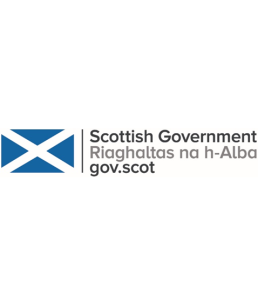
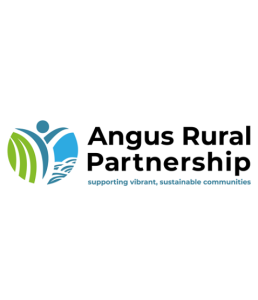
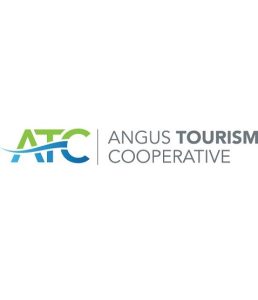
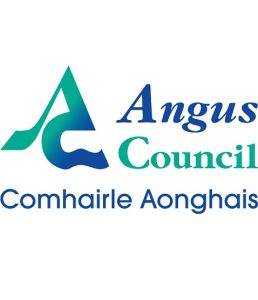
Supported by Angus Rural Partnership with funding from the Scottish Government’s Rural Community-Led Local Development Fund 2023/24, part of the Scottish Rural Development Programme.

